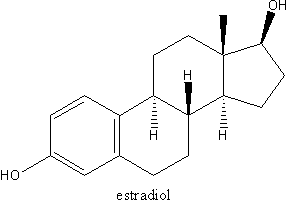Synopsis
Ethinyl estradiol/levonorgestrel (Seasonale) is the first extended-cycle oral contraceptive. With Seasonale, women take active hormone for 84 consecutive days, then hormone-free tablets for 7 days, resulting in one menstrual period every three months. Each active tablet contains 30 mcg of ethinyl estradiol and 150 mcg of levonorgestrel.
Safety
Short-term adverse events and safety concerns are similar to those for other combination oral contraceptives and include thrombosis, carcinoma, gallbladder disease, carbohydrate and lipid metabolism, and hypertension. Although the extended cycle regimen results in a longer hormone exposure than conventional oral contraceptives (i.e., nine additional weeks per year); it is not known whether this increases the risk of adverse events, especially regarding thrombosis.
Tolerability
In a premarketing study, (1) more women on the extended cycle regimen than those on the conventional regimen discontinued use (40.6 versus 28.8 percent, respectively). Most discontinuation occurred within the first 26 weeks of use. Unexpected menstrual bleeding occurred four times as often with the extended cycle regimen (12 versus 3 percent) and discontinuation because of unacceptable bleeding was four times higher (7.7 versus 1.8 percent). (1) After one year of treatment, there was no significant difference in the rates of unexpected bleeding (39 versus 42 percent). (2) Women who continued use were those who preferred having fewer menstrual cycles. Headache was less common among women in the extended cycle regimen than among those in the conventional regimen (Nordette): 21 versus 28 percent, respectively. (1) There were no significant changes in weight or blood pressure, and changes in triglyceride and low-density-lipoprotein cholesterol levels were comparable between extended cycle and conventional use. (1,2) It remains unstudied at this point whether fewer menstrual cycles result in fewer menstrual-related symptoms.
Efficacy
In a one-year study of sexually active, English-speaking women 18 to 40 years of age, the pregnancy rates for the extended cycle regimen (0.9 percent) and conventional regimen (1.3 percent) were similar. (1) According to clinical trial data submitted to the U.S. Food and Drug Administration, the number of pregnancies expected per 100 women each year are: less than one for intramuscular medroxyprogesterone (Depo-Provera); one for transdermal (Ortho Evra) and combined oral contraceptives; 12 for intravaginal combined oral contraceptives (NuvaRing); and two for progestin-only pills and ethinyl estradiol/levonorgestrel. (3)
Price
The average monthly price of ethinyl estradiol/levonorgestrel is comparable to conventional brand oral contraceptives and is more expensive than taking generically available oral contraceptives in the same manner (currently off-label for conventional regimens). Some insurance payers may require a higher co-pay for the 91-day cycle of ethinyl estradiol/levonorgestrel if purchased in a retail pharmacy.
Simplicity
Ethinyl estradiol/levonorgestrel is dispensed to the patient as a three-month supply. Only having to refill the prescription four times per year rather than 12 times per year may be an advantage over conventional oral contraceptives, although this can easily be overcome by prescribing three months of the conventional oral contraceptive at one time.
Bottom line
Women using ethinyl estradiol/levonorgestrel can expect similar or improved effectiveness and fewer menstrual cycles. Due in part to an increased incidence of unexpected bleeding in the first six months of use, a greater percentage of women will discontinue this regimen than will those using standard oral contraceptives.
REFERENCES
(1.) Anderson FD, Hait H. A multicenter, randomized study of an extended cycle oral contraceptive [published correction appears in Contraception 2004;69:175]. Contraception 2003;68:89-96.
(2.) Ethinyl estradiol/levonorgestrel (Seasonale). Package insert. Pomona, N.Y.: Duramed Pharmaceuticals, Inc., 2003. Accessed online March 21, 2005, at: http://www.seasonale.com/Seasonale_prescribing_info.pdf.
(3.) Allen J. Detail-Document #191010: hormonal contraception. Pharmacist's Letter 2003;19:191010.
STEPS drug updates cover Safety, Tolerability, Effectiveness, Price, and Simplicity. Each update provides an independent review of a new medication by authors who have no financial association with the drug manufacturer.
The series coordinator is Allen F. Shaughnessy, Pharm.D., Tufts University Family Medicine Residency Program, Boston, Mass.
STEPHEN A. WILSON, M.D., is assistant director at the University of Pittsburgh Medical Center, St. Margaret Family Practice Residency, Pittsburgh, Penn.
HEATHER A. KUDIS, PHARM.D., is a family medicine pharmacy resident in the Department of Education, at the University of Pittsburgh Medical Center, St. Margaret Family Practice Residency, Pittsburgh, Penn.
COPYRIGHT 2005 American Academy of Family Physicians
COPYRIGHT 2005 Gale Group



